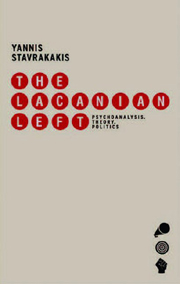Book contents
- Frontmatter
- Contents
- Bibliographical Note
- Acknowledgements
- Dedication
- Introduction: Locating the Lacanian Left
- PART I Theory: Dialectics of Disavowal
- PART II Analysis: Dialectics of Enjoyment
- 4 What Sticks? From Symbolic Power to Jouissance
- 5 Enjoying the Nation: A Success Story?
- 6 Lack of Passion: European Identity Revisited
- 7 The Consumerist ‘Politics of Jouissance’ and the Fantasy of Advertising
- 8 Democracy in Post-Democratic Times
- Bibliography
- Index
7 - The Consumerist ‘Politics of Jouissance’ and the Fantasy of Advertising
from PART II - Analysis: Dialectics of Enjoyment
Published online by Cambridge University Press: 12 September 2012
- Frontmatter
- Contents
- Bibliographical Note
- Acknowledgements
- Dedication
- Introduction: Locating the Lacanian Left
- PART I Theory: Dialectics of Disavowal
- PART II Analysis: Dialectics of Enjoyment
- 4 What Sticks? From Symbolic Power to Jouissance
- 5 Enjoying the Nation: A Success Story?
- 6 Lack of Passion: European Identity Revisited
- 7 The Consumerist ‘Politics of Jouissance’ and the Fantasy of Advertising
- 8 Democracy in Post-Democratic Times
- Bibliography
- Index
Summary
Desire is the very essence of man
SpinozaEvery political economy is libidinal
Jean-François LyotardVictorious consumerism?
The preceding explorations of nationalism and European identity reveal how much the fate and prospects of particular identifications and hegemonic projects rely on the affective dimension, on jouissance in its different modalities and interactions with the world of signification and social practice. Obviously the emergence of the ‘new’ cannot succeed if it ignores this important parameter, but this is not to say that sedimented, libidinally invested identifications are in any way privileged to retain their hegemonic position indefinitely. Processes of dis-identification and affective re-investment are, on the contrary, part and parcel of social and political life. In capitalist – especially late capitalist – societies it is the role of consumption and consumerism and the function of advertising, public relations and branding that offer perhaps the best example of how new interpellations and commands can re-shape social structure by imposing their hegemonic grip on individual and group identifications and behaviour. To be sure, nobody will be surprised if I argue that today consumerism constitutes one of the central aspects of social life or that advertising is one of the hegemonic discursive tropes in late modernity, staging the fantasy frame that ensures that our identity as consumers sticks. As Garry Cross has put it, consumerism, despite all the opposition, seems to be ‘the “ism” that won’ (Cross 2000:1). It did succeed where other ideologies and discourses failed.
- Type
- Chapter
- Information
- The Lacanian LeftPsychoanalysis Theory Politics, pp. 227 - 253Publisher: Edinburgh University PressPrint publication year: 2007



